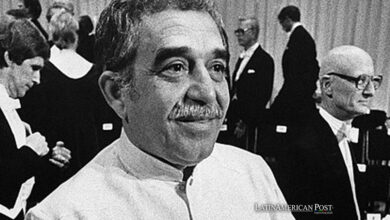Latam Booklook: “Diary of a madman” by Lu Hsun
Listen this article
In a society in which cannibalism has been 'normalized', is it mad who refuses to eat others?
What is it about?
Since Atreo serves his brother Tiestes a dinner with the flesh of his children in Greek mythology, going through the obsession and fear with the 'cannibal Indians' when the Europeans arrived in America, until the recent documentary Caniba (2018) on the Japanese Issei Sagawa, convicted of the homicide and subsequent consumption of Renee Hartevelt in 1981, cannibalism has fascinated humans throughout history.
Whether as part of the imaginary of another that breaks the taboo of eating human flesh, whether as the mentally ill whose desire is condemned socially, the figure of the cannibal has been a theme of the artistic field, a way of addressing the monstrosity.
What happens when that situation of the cannibal as a marginal of society, like the savage of civilization, is inverted? That is the core of Diary of a madman, edited by Taller Roca and translated by Sergio Pitol, by Chinese author Lu Hsun. A short story about a man who one day 'realizes' that all the people around him eat human flesh.
Through the different entries in the diary, the narrator gradually becomes obsessed with words related to eating, with the looks and sharp teeth of his neighbors, which leads him to the conjecture that his family and neighbors are cannibals.
In the development of the story, there is always the question of whether it is paranoia of the protagonist, since we only see through his eyes, or if he has truly discovered that hidden facet of those with whom he has lived all his life. "Just today I notice that I have lived my whole life among people who eat human flesh for four thousand years," he laments. In that uncertainty, one reads each entry in the diary, as we enter the head of this madman or of this enlightened one?
You may be interested: Latam Booklook: 'Tropical Virus' by Power Paola
Who is the author?
Lu Hsun is the representative of the intellectual figure whose works oscillate between writing fiction and political activism, because of the time of political changes in which he lived. He was born in 1881 under the name of Zhou Zhangshou in Shaoxing, Zhejiang province in China, in a wealthy family.
Even if this status was maintained for several years – liquidity that allowed him to live several years in Japan, devote himself to the leisure of reading and buying rare books -, Hsung witnessed the disintegration of his family. First for the imprisonment of his grandfather for corruption, then for problems with his brother for a Japanese woman.
Also, the Chinese writer lived the fall of the empire and the emergence of political parties such as the Kuomintang (nationalist party) and the Chinese Communist Party, which he was sympathetic of. This left-wing position was in line with his anti-traditionalist view of literature, which was represented in his tensions with Confucian customs and in his break with Chinese literary language. Therefore, the book was written in pai-jua, the ideographic transcription of the spoken language. His work is also divided between moral treatises and 'realistic' stories.
Although he died of tuberculosis in 1936, Hsun later gained fame for the praise that Mao's Chinese Cultural Revolution gave him. His works, thanks to that, were published in their entirety and translated throughout the world.
Read also: Why a cannibal diet would be a serious nutritional error?
Do I read it or not?
It is a strange story. A kind of world in reverse of which one is never sure if it is a reality or fruit of the paranoia of its narrator. This ambiguity in the judgment of whether the world is cannibal or if one imagines others eating human flesh is what gives richness to the text, because it poses the question: is madness a lucidity in a world where social conventions are followed without questioning or criticism?
Beyond the debates about how madness was interpreted pathologically from disobedience or breach of certain social pacts established by the religious or political convention, Diary of madman raises madness from a highly subjective point of view in which one never knows if everything that happens is in the head of the protagonist.
The paranoid vision of him is transmitted to the reader with an effectiveness that in the end one distrusts if in truth the name of the newspaper was put by the narrator or by his presumably cannibal brother.
In a broader sense, this story could also be interpreted metaphorically as a political awakening, an awareness that society around you has 'wild' practices and see the horror of having normalized.
Of course, in the context of political changes that Hsun lived in China, the story of an awareness, even against the grain of the community in which he lives, could serve as encouragement for young people to militate for the party that wanted to change the history of the last 4000 years. To show that capitalist consumption could be equated with cannibalism did not sound preposterous, neither at that moment, nor now.
So, yes, read this book, either by entering into a vision of madness or to begin to doubt the social conventions that we follow. It is a reading that gives one another glasses to face reality.
LatinAmerican Post | Gabriel Bocanegra
Translated from "Diario de un loco" de Lu Hsun2"






